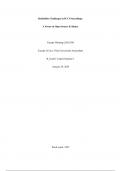Reliability Challenges in ICC Proceedings:
A Focus on Open Source Evidence
Teuntje Wenting (2818359)
Faculty of Law, Vrije Universiteit Amsterdam
R_ExpS1: Expert Seminar 1
January 29, 2024
Word count: 3455
, Introduction
Over recent years, core international crimes, including genocide, war crimes, crimes
against humanity, and the crime of aggression (International Criminal Court [ICC], 2002), are
being perpetrated across the world. Still, the lack of evidentiary material concerning
international crimes creates impediments in the initiation of international criminal
procedures. As a result, the issue of obtaining sufficient evidence to facilitate future
investigations and prosecutions of international crimes remains (Hamilton, 2018).
The utilization of technology to secure evidence for the commission of international
crimes, in addition to witness and victim testimonies, is a well-established practice in
international criminal justice. The International Military Tribunal for Nuremberg was the first
to rely on documentary evidence, such as photographs, films, and government- and military
records. This laid the groundwork for future international criminal cases, and the creation of
International Criminal Tribunals for the former Yugoslavia (1993) and Rwanda (1994)
followed. The reliance on digital evidence progressed, and the use of more advanced methods
in forensic science and satellite imagery intelligence became widespread within the tribunals.
The recent proliferation and progress in technology, coupled with evidentiary issues named
above have increased the reliance on digital evidence in international criminal processes
(Freeman, 2018).
Open source evidence has become an integral part of modern digital investigations,
including those carried out by the International Criminal Court (ICC) (Freeman, 2018;
McDermott et al., 2021). The Berkeley protocol, which incorporates the first universal
comprehensive standards on open source investigations, defines open source information as
information that any member of the public can observe, purchase or request, without
requiring special legal status or authorized access. Open source evidence is open source
information with evidentiary value that may be admitted in order to establish facts in legal





